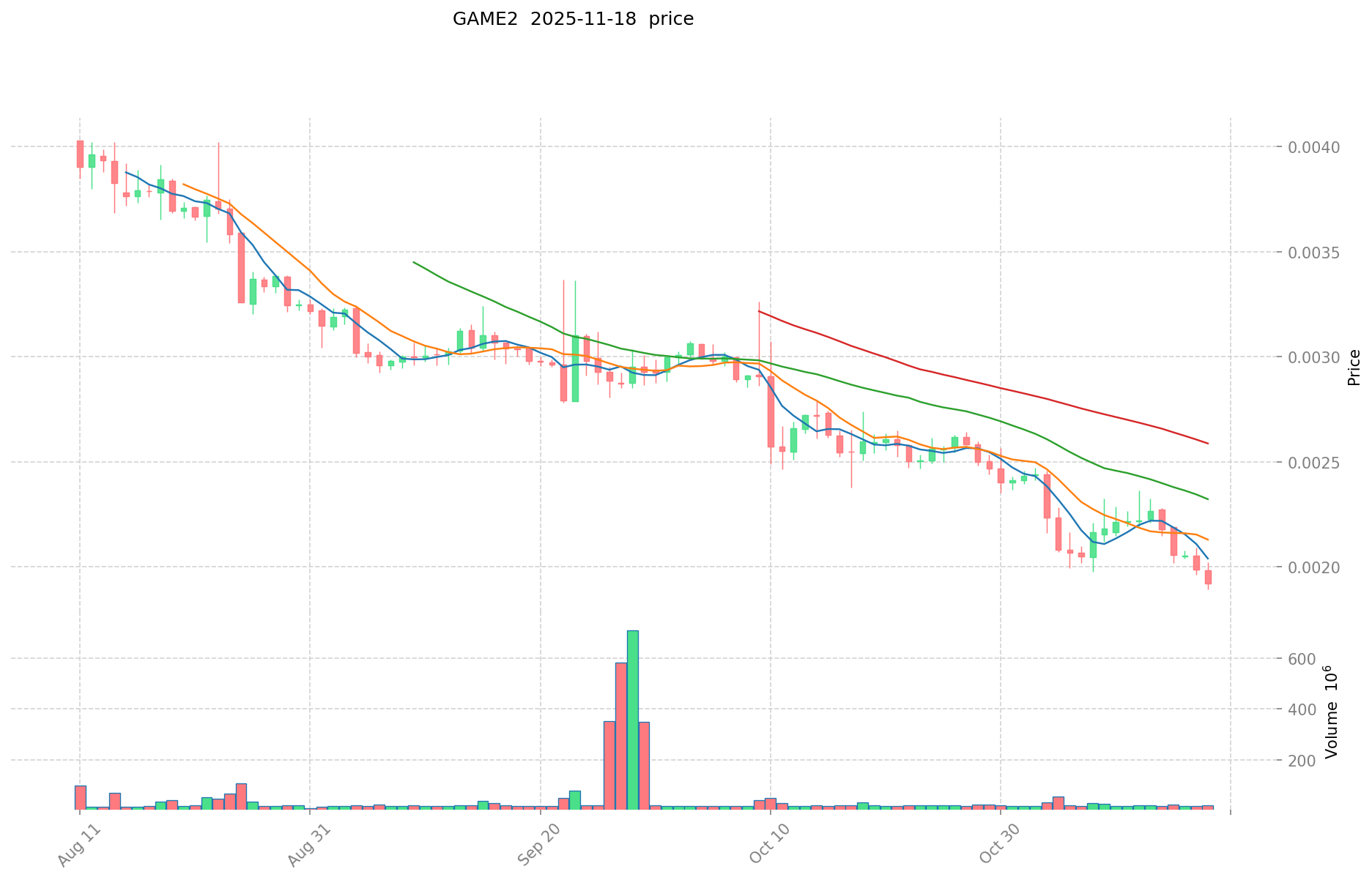What is GAME2: The Next Evolution in Blockchain Gaming Technology
GameBuild's Positioning and Significance
In 2024, GameBuild (GAME2) was launched as a next-generation gaming infrastructure, aiming to address the challenges in the gaming industry such as lack of economic benefits for players and developers.
As a blockchain-based crowdfunding platform for independent game developers, GameBuild plays a crucial role in the gaming and NFT sectors.
As of 2025, GameBuild has become an important player in the blockchain gaming industry, with a market cap of $35,281,847 and an active community of developers and gamers.
This article will provide an in-depth analysis of its technical architecture, market performance, and future potential.
Origin and Development History
Background
GameBuild was created in 2024 to solve the challenges faced by independent game developers in raising funds and monetizing their creations. It was born during the boom of blockchain technology and NFTs, aiming to provide a new economic model for the gaming industry through pre-selling game assets as NFTs.
The launch of GameBuild brought new possibilities for game developers, players, and advertisers.
Important Milestones
- 2024: Mainnet launch, enabling game developers to raise funds through NFT pre-sales.
- 2025: Major upgrade introducing a trading market for digital assets of successfully released games.
- 2025: Adoption by independent game developers, pushing the price to its all-time high of $0.013.
With the support of its community and development team, GameBuild continues to optimize its technology, security, and real-world applications in the gaming industry.
How Does GameBuild Work?
Decentralized Control
GameBuild operates on a decentralized network of computers (nodes) worldwide, free from control by traditional gaming companies or centralized platforms. These nodes collaborate to validate transactions, ensuring system transparency and attack resistance, giving users greater autonomy and improving network resilience.
Blockchain Core
GameBuild's blockchain is a public, immutable digital ledger that records every transaction. Transactions are grouped into blocks and linked through cryptographic hashes to form a secure chain. Anyone can view the records, establishing trust without intermediaries.
Ensuring Fairness
GameBuild uses a consensus mechanism to validate transactions and prevent fraudulent activities such as double-spending. Participants maintain network security through activities like staking or running nodes and are rewarded with GAME2 tokens.
Secure Transactions
GameBuild uses public-private key encryption to protect transactions:
- Private keys (like secret passwords) are used to sign transactions
- Public keys (like account numbers) are used to verify ownership
This mechanism ensures fund security, while transactions remain pseudonymous. Additional security features may include smart contract audits and multi-signature wallets.
GAME2's Market Performance
Circulation Overview
As of November 18, 2025, GAME2's circulating supply is 18,356,840,358 tokens, with a total supply of 21,419,639,000.
Price Fluctuations
GAME2 reached its all-time high of $0.013 on May 18, 2024. Its lowest price was $0.001892, occurring on November 17, 2025. These fluctuations reflect market sentiment, adoption trends, and external factors.
Click to view the current GAME2 market price

GameBuild Ecosystem Applications and Partnerships
Core Use Cases
GameBuild's ecosystem supports various applications:
- Gaming Infrastructure: Provides powerful toolkits for game developers, players, and advertisers.
- NFT Marketplace: Enables trading of digital assets from successfully released games.
Strategic Partnerships
GameBuild has established partnerships to enhance its technological capabilities and market influence. These partnerships provide a solid foundation for GameBuild's ecosystem expansion.
Controversies and Challenges
GameBuild faces the following challenges:
- Market Competition: The emergence of other blockchain gaming platforms.
- Regulatory Uncertainty: Potential regulatory scrutiny in the gaming and crypto space.
These issues have sparked discussions within the community and market, driving continuous innovation for GameBuild.
GameBuild Community and Social Media Atmosphere
Fan Enthusiasm
GameBuild's community shows vitality, with metrics such as 1,365 holders. On X platform, related posts and tags like "#GameBuild" often trend.
Social Media Sentiment
Sentiment on X presents a mixed picture:
- Supporters praise GameBuild's innovative approach to gaming infrastructure.
- Critics focus on issues such as price volatility.
Recent trends show a general bearish sentiment, with the price down 49.73% over the past year.
Hot Topics
X users actively discuss GameBuild's potential in revolutionizing the gaming industry and the challenges it faces in mainstream adoption.
More Information Sources for GameBuild
- Official Website: Visit GameBuild's official website for features, use cases, and latest updates.
- White Paper: GameBuild's White Paper details its technical architecture, goals, and vision.
- X Updates: On X platform, GameBuild uses @GameBuild_ handle.
GameBuild Future Roadmap
- Ecosystem Goal: Support game developers and players with advanced blockchain-based tools.
- Long-term Vision: Become a leading infrastructure for blockchain gaming.
How to Participate in GameBuild?
- Purchase Channels: Buy GameBuild (GAME2) on Gate.com.
- Storage Solutions: Use secure wallets compatible with ERC20 tokens.
- Participate in Gaming: Engage with games and platforms built on GameBuild infrastructure.
- Ecosystem Development: Visit the developer documentation to contribute to the GameBuild ecosystem.
Summary
GameBuild is redefining blockchain gaming infrastructure, offering tools for developers, players, and advertisers. Its active community and clear vision make it a notable project in the crypto gaming space. Despite facing challenges like market competition and price volatility, GameBuild's innovative spirit and roadmap position it as a potential key player in the future of decentralized gaming technology. Whether you're a newcomer or an experienced crypto enthusiast, GameBuild is worth watching and participating in.
FAQ
What is a quick and dirty game?
A quick and dirty game is a fast-paced, simple party game with easy rules. It's designed for quick setup and play, often featuring humorous or risqué content, making it ideal for social gatherings.
What is game use?
Game use refers to the application of games for entertainment, learning, or skill development. In crypto, it often involves using game mechanics to engage users in blockchain activities or token ecosystems.
Share
Content